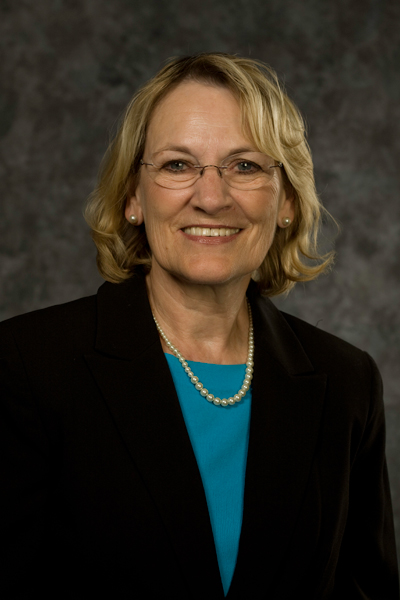FAYETTEVILLE, Ark. – A University of Arkansas staff member is serving on a panel that will make recommendations for the reauthorization of the U.S. Elementary and Secondary Education Act in the area of English as a second language and bilingual education.
Judy Hobson was one of 15 people selected by Thelma Melendez de Santa Ana, assistant U.S. secretary of education, to generate recommendations related to bilingual learners. The 15-member panel was given 10 categories to consider. It will first discuss the recommendations in a telephone conference call before a strategic planning meeting March 12 and 13 in San Jose, Calif., to consolidate and prioritize them. Congress is expected to consider reauthorizing the No Child Left Behind Act, the current incarnation of Lyndon Johnson's Elementary and Secondary Education Act, this year.
Hobson directs the Northwest Arkansas Education Renewal Zone 2 based in the College of Education and Health Professions at the university. She took this position in 2007 after working for 12 years as coordinator of English as a second language and migrant programs in the Springdale School District. Before that, she spent 13 years as a classroom teacher and 14 years as an elementary assistant principal.
"When I first started as director of federal programs in 1995, the Springdale district was just beginning to enroll English language learners," Hobson said. "I was in charge of creating an ESL program for the district, at a time when we had identified about 365 children as English language learners. In 2009-10, the district has more than 7,500 English language learners."
Elena Izquierdo, an assistant professor of teacher education at the University of Texas at El Paso, recommended that Hobson sit on the advisory panel. Izquierdo has taught with Hobson numerous times in ESL academies for Arkansas teachers.
"She really wants Arkansas to have input," Hobson said of Izquierdo. "She told me she wanted me because of my association with the Springdale schools, other northwest Arkansas schools and the Arkansas Department of Education. Arkansas has a reputation for being proactive in the education of English language learners. I am honored to have this opportunity to work on the national stage."
Soon after agreeing to serve on the panel, Hobson contacted directors of English for Speakers of Other Languages programs at several school districts in northwest Arkansas. From 1999 to 2009, the state of Arkansas experienced a 130 percent increase in the number of students identified as being limited in English proficiency, according to the Arkansas Department of Education, and many of those are concentrated in northwest Arkansas because of its history of low unemployment.
"I value their opinions," Hobson said of her colleagues at the schools. "I immediately began to get responses. I told them don't even worry about writing complete sentences – send me any ideas you have. The Rogers ESOL district staff members planned to discuss the recommendations at one of their regular meetings."
In her position as Education Renewal Zone 2 director, Hobson works with schools that are partners with the Education Renewal Zone. In 2003, the Arkansas General Assembly established Education Renewal Zones across the state to promote collaboration among public schools, education service cooperatives, colleges and universities, and parents and communities. The Northwest Arkansas Education Renewal Zone was established in 2005 to address the needs of schools in Washington, Benton and Madison counties with the objective of improving student achievement. Centralizing resources allows schools in northwest Arkansas access to financial, cultural and technological support.
Hobson is also calling on the expertise of several faculty members of the College of Education and Health Professions, which prepares teachers and school administrators.
"I think most of our responses will pertain to the assessment and accountability categories," she said. "Our schools here are concerned about the proficiency requirement after one year. For many students, depending where they came from, one year is not enough time to become proficient in English and the content areas in which they are assessed. No research supports that short of a time frame, and an entire school can be placed in school improvement status if these students are not proficient.
"Obviously, we agree that the students need to be tested after one year, but I think we will recommend that the test scores after only one year in U.S. schools not be used in the accountability piece of the law," Hobson continued.
Another possible recommendation she anticipates is that all teachers and administrators who work with English language learners be required to have ESL certification. Hobson, Diana Gonzales Worthen and Janet Penner-Williams in the College of Education and Health Professions wrote a grant in 2007 that was funded by the U.S. Department of Education to endorse 100 teachers within the Springdale School District. In Project Teach Them All, Springdale teachers take University of Arkansas graduate courses delivered at their schools to earn the ESL endorsement within two years.
Hobson also helped to establish an annual ESL Symposium sponsored by the Education Renewal Zone and the curriculum and instruction department in the college. This year's symposium, set for Friday, Feb. 26, features information on both the academic and legal aspects of teaching English language learners.
"I think we may also suggest to the panel that common standards be established across all states for the identification and reclassification of English language learners," Hobson said. "Right now, each state uses different criteria."
Contacts
Judy Hobson, co-director, Northwest Arkansas Education Renewal
College of Education and Health Professions
479-575-3511,
Heidi Wells, content writer and strategist
Global Campus
479-879-8760,
